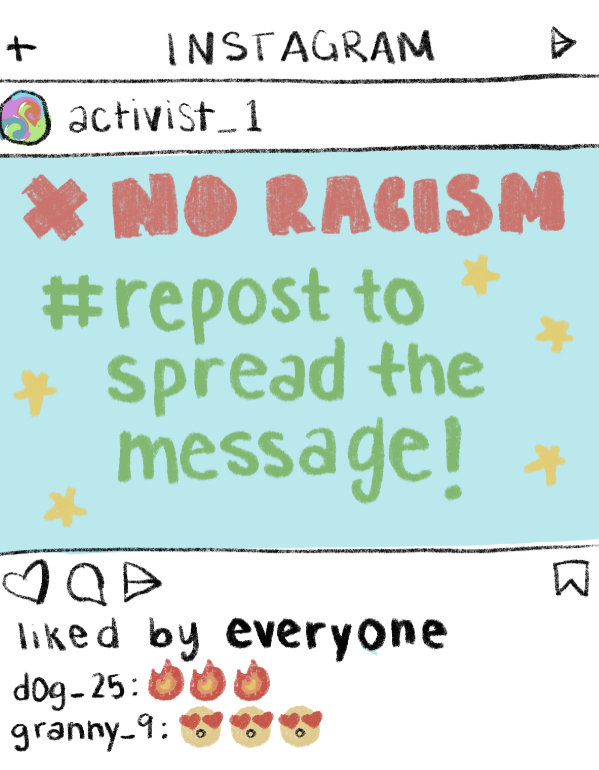Students reflect on authenticity of social media activism
With social media being such a prominent aspect of our everyday lives, it has also become a crucial outlet for activism for many users. Whether people use their platform to speak out against racism or spread mental health awareness, feeds are frequently filled with slides spreading political information. However, the argument on how beneficial social media activism is remains a persistent question, especially because of the amount of influence it has over it’s majority teen user base.
“Social media is probably my main source of news, just because I am on it more often than any other news outlet. Whether that’s people’s Instagrams stories, different politicians or news sites I follow on Instagram, I am definitely seeing more news on social media than other places.” senior Vivian Miller says.
The constant use of social media throughout the teenage community makes it easy to get information out there. However, there are also concerns regarding the spread of misinformation on social media. For example Americans engaged with twice as much unreliable news in 2020 due to the COVID-19 pandemic and the presidential election. However, junior Isabella Rene explains that this is also part of what makes social media such an effective platform for activism to take place.
“The ability to get things out so quickly to a huge number of people is such a good thing about social media activism,” Rene explains. “And, also, it’s so accessible and easy to find and to learn about new things, like new movements. It is just a really good platform to find some things out.”
And, for the most part, teens aren’t spending their time reading the news, so despite the possibility of misinformation, news released through social media may just be the only source to learn about current events.
“Posting like that shares the word and educates you, as one of your news sources,” sophomore Cade Likhite says.
With 42 percent of young Americans primarily getting their news online, social media’s influence on our perception of current events is inevitable. The rise in political messages being expressed through social media has also prompted a culture in which social media is a vital part of the process of activism. However, this has also led to some believing that social media activism is equal in power to more traditional methods of protesting. Senior Emma Boczkowski explains this feeling.
“I think it is really good to use your platform. For people to click on your page and see things and be like, ‘Oh, I didn’t know that, I am going to do more research on that.’ But, where I think it becomes negative is when it stops with posting. I think that, if you are going to post, you need to actively do more than just posting, especially when there are things that you can do,” Boczkowski says.
Boczkowski acknowledges that she herself was not always the most accurate social media poster up until a couple years ago. As she continued to grow as an activist for the LGBTQ+ and LatinX community, she claimed something felt missing from the posts.
“I think it was the fact that I would just post, and nothing else would happen afterwards. I would just post things to post and thought that this was helpful, when, in reality, it wasn’t. What clicked was that I realized I needed to do something beyond just posting, so I began to start doing my own research,” Boczkowski explains.
Boczkowski also brings up the topic of performative activism, which many teens feel pressured to participate in, especially when it’s so much simpler than the possibility of getting in trouble by participating in movements like walkouts or marches.
“I think [social media activism] is really productive in a way, but also not, because it’s so much easier to get the word out about anything really with social media, but at the same time, I think it creates a space where people can just say that they’re doing things where they’re actually not,” Rene says.
Despite knowing that performative activism can be a problem, Rene still believes that social media activism can be, and is, an effective way of spreading news.
It is important to remember that posting things on social media is not the same as going out and participating in protests and movements happening in the world, not just behind screens.
“Yeah, social media activism looks like [posting and reposting things] to me, but I feel like real activism is not totally like that.” says Rene.
Junior Felix Konzak sees the gap between social media activism and participating in movements offline as large.
“I think activism on social media is a very small step in the sense of, yes, it spreads awareness, but when it comes to actual activism and making a change, it falls short,” Konzak says.
Konzak explained that, as much as social media activism spreads the word, most people are reaching out to a very small community of people that most likely have the same views as the person posting.
As much as social media activism gets the idea out there, everyone agrees that people need to commit themselves more to ongoing research.
“Social media activism would definitely be more productive if everyone took the time to educate themselves about the subject before and even after posting about it,” Miller says.
Your donation will support the student journalists of the Evanstonian. We are planning a big trip to the Journalism Educators Association conference in Philadelphia in November 2023, and any support will go towards making that trip a reality. Contributions will appear as a charge from SNOSite. Donations are NOT tax-deductible.








